Hanandeh, Adel
955 Bethesda Drive
1st Floor
Zanesville, OH 43701
United States
Adel Hanandeh, M.D., has joined the Genesis Heart & Vascular Group, specializing in vascular surgery. Dr. Hanandeh graduated magna cum laude from St. George's University School of Medicine, St. George's, Grenada, and completed his internship and early residency at Columbia University Vagelos College of Physicians and Surgeons, with clinical training based at Harlem Hospital in New York City. He then completed his General Surgery residency at Case Western Reserve University and the MetroHealth System in Cleveland, Ohio, where he served as Chief Resident in Surgery.
Dr. Hanandeh went on to complete a fellowship in Vascular and Endovascular Surgery at the University of Central Florida. He is board-certified in General Surgery and holds additional certifications in minimally invasive and endoscopic surgery. He is also RPVI-certified (Registered Physician in Vascular Interpretation), demonstrating advanced skills in vascular imaging and diagnosis.
Dr. Hanandeh received the prestigious Gold Humanism Honor Society award. He has authored multiple peer-reviewed publications in General and Vascular Surgery and is an active member of both the Society for Vascular Surgery and the American College of Surgeons.
Dr. Hanandeh is a compassionate and dedicated surgeon committed to delivering state-of-the-art, patient-centered care. His approach combines the latest surgical techniques with a strong focus on personalized, high-quality treatment tailored to each patient’s individual needs.
Vascular and Endovascular Surgery
University of Central Florida
HCA Healthcare General Medical Education Program
Orlando, Florida
St. George's University School of Medicine
St. George's, Grenada
General Surgery Internship and Residency
Columbia University/Valgus College of Medicine at Harlem Hospital Center
New York, New York
General Surgery - Chief Resident
Case Western Reserve University and MetroHealth System
Cleveland, Ohio
American Board of Surgery (ABS)
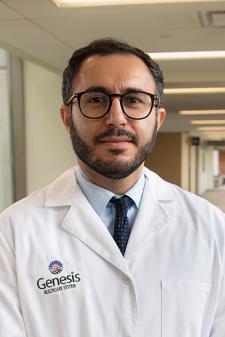
Adel Hanandeh, M.D., specializes in vascular surgery. Dr. Hanandeh is a compassionate and dedicated surgeon committed to delivering state-of-the-art, patient-centered care. His approach combines the latest surgical techniques with a strong focus on personalized, high-quality treatment tailored to each patient’s individual needs.
Gales, Jordan M.
955 Bethesda Drive
1st Floor
Zanesville, OH 43701
United States
Jordan Gales, M.D., specializes in clinical cardiac electrophysiology and is board-certified in internal medicine and cardiovascular disease. Dr. Gales completed a clinical cardiac electrophysiology and adult cardiovascular disease fellowship at the Texas Heart Institute, Houston, Texas, where he served as Chief Fellow and was named Outstanding Cardiology Fellow for the 2020–2023 academic years. He completed his internal medicine residency at the Duke University Hospitals, Durham, North Carolina and earned his doctor of medicine from the Cleveland Clinic Lerner College of Medicine CWRU, Cleveland, Ohio, graduating with honors and special qualifications in clinical research. Dr. Gales has Level II COCATS training in multiple key cardiovascular imaging and diagnostic modalities, including echocardiography, nuclear cardiology, and electrophysiology. His clinical interests include arrhythmia diagnosis and management, catheter ablation, device implantation, and advanced cardiac imaging. With a commitment to evidence-based care and a compassionate approach to patient health, Dr. Gales is excited to serve the community through Genesis Heart & Vascular Group.
Texas Heart Institute
Houston, Texas
Cleveland Clinic Lerner College of Medicine CWRU
Cleveland, Ohio
Duke University Hospitals
Durham, North Carolina
Internal medicine
Cardiovascular disease
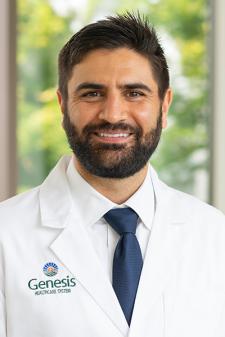
Jordan Gales, M.D., specializes in clinical cardiac electrophysiology and is board-certified in internal medicine and cardiovascular disease.
Engel, Jamie L.
Davies, Alexandra M.
999 Garden Road
Zanesville, OH 43701
United States
Alexandra Davies, D.O., has joined Genesis Digestive Disease Specialists specializing in gastroenterology. She completed her gastroenterology fellowship at McLaren Greater Lansing, Lansing, Michigan, where she also served as a teaching faculty member for Michigan State University. Dr. Davies completed her internal medicine internship and residency at McLaren Macomb, Mount Clemens, Michigan, and earned her Doctor of Osteopathic Medicine degree from the Kentucky College of Osteopathic Medicine, Pikeville, Kentucky. She is an active member of several prominent medical organizations, including the American College of Gastroenterology, the American Gastroenterological Association, the American College of Physicians and the American Society for Gastrointestinal Endoscopy. Dr. Davies looks forward to providing high-quality, patient-centered gastroenterological care as part of the Genesis Medical Group team. She enjoys running marathons and hanging out with her family during her free time.
McLaren Greater Lansing
Lansing, Michigan
Kentucky College of Osteopathic Medicine
Pikeville, Kentucky
McLaren Macomb
Mount Clemens, Michigan
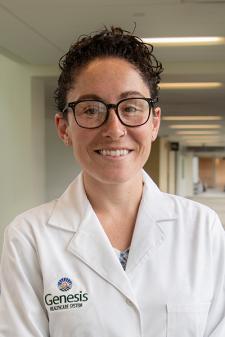
Alexandra Davies, D.O., specializes in gastroenterology. Dr. Davies looks forward to providing high-quality, patient-centered gastroenterological care as part of the Genesis Medical Group team.
999 Garden Road
Zanesville, OH 43701
United States
Cova, Jennifer L.
945 Bethesda Drive
Ste 330
Zanesville, OH 43701
United States
Clouse, Christopher S.
2951 Maple Avenue
Zanesville, OH 43701
United States
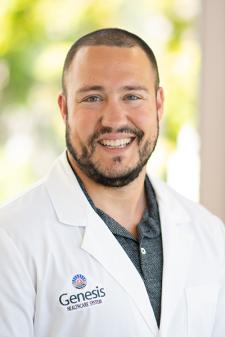
Caminiti, Deanna D.
2951 Maple Avenue
Zanesville, OH 43701
United States
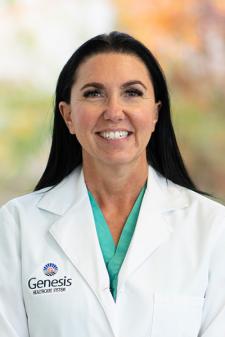
Bediako, Persey O.
955 Bethesda Drive
1st Floor
Zanesville, OH 43701
United States
Meet Persey O. Bediako, M.D., with Genesis Heart & Vascular Group, specializing in general cardiology. Dr. Bediako completed a cardiovascular fellowship at Maine Medical Center, Portland, Maine, and internal medicine residency at the University of Virginia, Charlottesville, Virginia. He earned his doctor of medicine degree from the University of Maryland School of Medicine in Baltimore, Maryland. Dr. Bediako holds board-certification in internal medicine, nuclear medicine and echocardiography. He is a member of the American College of Cardiology and the American College of Physicians.
2022-2025 Maine Medical Center
2014-2018
University of Maryland Medical Center
2018-2022
University of Virginia Medical Center
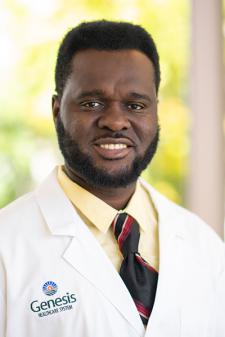
Meet Persey O. Bediako, M.D., with Genesis Heart & Vascular Group, specializing in general cardiology.
Alley, Sarah J.
401 Lincoln Park Drive
New Lexington, OH 43764
United States
Sarah Alley, M.D., is a board-certified family medicine physician with over 30 years of experience in both outpatient and inpatient care. Dr. Alley received her doctorate of medicine from The Ohio State University College of Medicine, Columbus, Ohio, and completed her family practice residency at Riverside Methodist Hospital, in Columbus, where she served as Chief Resident. She earned her bachelor of arts in chemistry from Thiel College and pursued graduate studies in biochemistry at Ohio University, Athens, Ohio. Dr. Alley is an active member of the American Academy of Family Practice, the American Board of Family Medicine, and the Ohio State Medical Association. She is dedicated to improving patient outcomes through collaborative, high-quality care and looks forward to serving patients in and around Perry County.
1988-1992 Ohio State University
Columbus, Ohio
1992-1995 OhioHealth Riverside Methodist Hospital
Columbus, Ohio
American Board of Family Medicine
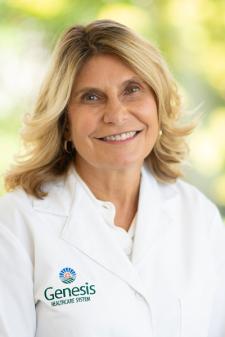
Sarah Alley, M.D., is a board-certified family medicine physician with over 30 years of experience in both outpatient and inpatient care. She is dedicated to improving patient outcomes through collaborative, high-quality care and looks forward to serving patients in and around Perry County.